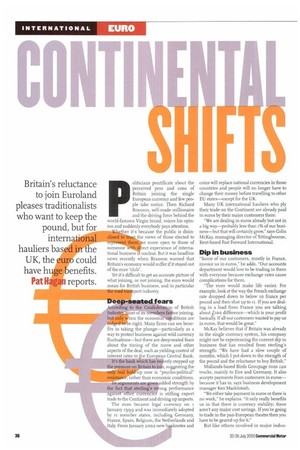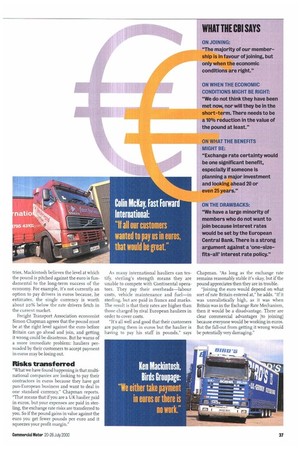p oliticians pontificate about the perceived pros and cons of Britain
Page 38

Page 39

If you've noticed an error in this article please click here to report it so we can fix it.
joining the single European currency and few people take notice. Then Richard Branson, self-made millionaire and the driving force behind the world-famous Virgin brand, voices his opinion and suddenly everybody pays attention. 'healer its because the public is disined to trust the views of those elected to
resent th r more open to those of someone rect experience of interna tional business i unclear. But it was headline news recently when Branson warned that Britain's economy would suffer if it stayed out of the euro "club".
Yet it's difficult to get an accurate picture of what joining, or not joining, the euro would mean for British business, and in particular the road tlport industry.
Deep-Seated fears
According to the Confederation of British Industry, most of its members favour joining, .iliiiiiiiithen the economic conditions are
e right. Many firms can see benefits in taking the plunge—particularly as a way to protect business against wild currency fluctuations—but there are deep-seated fears about the timing of the move and other aspects of the deal, such as yielding control of interest rates to the European Central Bank.
It's the bank which has recently stepped up the pressure on Britain to join, suggesting the only real hold-up now is "psycho-political" resistance, rather than economic conditions.
Its arguments are given added strength by the fact that sterling's strong performance against other currencies is stifling export trade to the Continent and driving up imports.
The euro became legal currency on r January r9 99 and was immediately adopted by II member states, including Germany, France, Spain, Belgium, the Netherlands and Italy. From January 2002 new banknotes and
coins will replace national currencies in those countries and people will no longer have to change their money before travelling to other EU states—except for the UK.
Many UK international hauliers who ply their trade on the Continent are already paid in euros by their major customers there.
"We are dealing in euros already but not in a big way—probably less than r% of our business—but that will certainly grow," says Colin McKay, managing director of Sittingboume, Kent-based Fast Forward International.
Dip in business
"Some of our customers, mostly in France, invoice us in euros," he adds. "Our accounts department would love to be trading in them with everyone because exchange rates cause complications for them.
The euro would make life easier. For example, look at the way the French exchange rate dropped down to below re, francs per pound and then shot up to ri. If you are dealing in a load from France you are talking about fro() difference—which is your profit basically. If all our customers wanted to pay us in euros, that would be great."
McKay believes that if Britain was already in the single currency system, his company might not be experiencing the current dip in business that has resulted from sterling's strength: "We have had a slow couple of months, which I put down to the strength of the pound and the reluctance to buy British."
Midlands-based Birds Groupage runs 120 trucks, mainly to Eire and Germany. It also accepts payments from customers in eurosbecause it has to, says business development manager Ken Mackintosh.
"We either take payment in euros or there is no work," he explains. "It only really benefits us in that there is currency stability; there aren't any major cost savings. If you're going to trade in the pan-European theatre then you have to be geared up for it."
But like others involved in major indus tries, Mackintosh believes the level at which the pound is pitched against the euro is fundamental to the long-term success of the economy. For example, it's not currently an option to pay drivers in euros because, he estimates, the single currency is worth about 20% below the rate drivers fetch in the current market.
Freight Transport Association economist Simon Chapman agrees that the pound must be at the right level against the euro before Britain can go ahead and join, and getting it wrong could be disastrous. But he warns of a more immediate problem: hauliers persuaded by their customers to accept payment in euros may be losing out.
Risks transferred
"What we have found happening is that multinational companies are looking to pay their contractors in euros because they have got pan-European business and want to deal in one standard currency," Chapman reports. "That means that if you are a UK haulier paid in euros, but your expenses are paid in sterling, the exchange rate risks are transferred to you. So if the pound gains in value against the euro you get fewer pounds per euro and it squeezes your profit margin." As many international hauliers can testify, sterling's strength means they are unable to compete with Continental operators. They pay their overheads—labour costs, vehicle maintenance and fuel—in sterling, but are paid in francs and marks. The result is that their rates are higher than those charged by rival European hauliers in order to cover costs.
"It's all well and good that their customers are paying them in euros but the haulier is having to pay his staff in pounds," says Chapman. "As long as the exchange rate remains reasonably stable it's okay, but if the pound appreciates then they are in trouble.
"Joining the euro would depend on what sort of rate Britain entered at," he adds. "If it was unrealistically high, as it was when Britain was in the Exchange Rate Mechanism, then it would be a disadvantage. There are clear commercial advantages [to joining] because everyone would be working in euros. But the fall-out from getting it wrong would be potentially very damaging."




















































































































